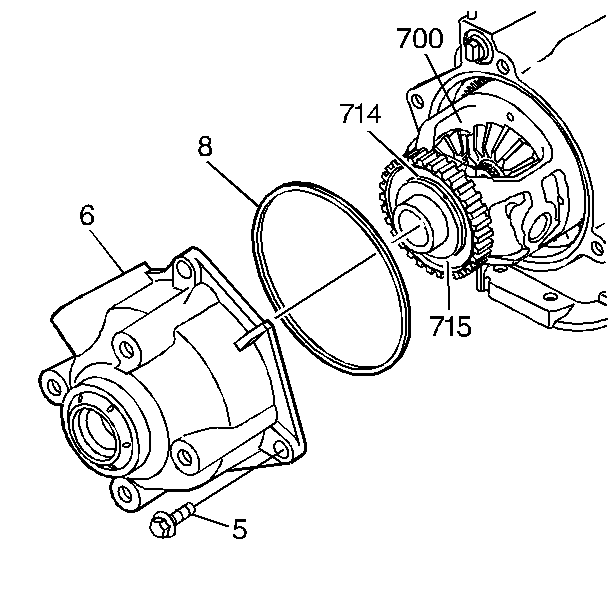Removal Procedure
- Disconnect the negative battery cable. Refer to Battery Negative Cable Disconnection and Connection .
- Raise and support the vehicle. Refer to Lifting and Jacking the Vehicle .
- Remove the right drive axle from the transaxle. Refer to Wheel Drive Shaft Replacement .
- Remove the transaxle brace. Refer to Transmission Brace Replacement .
- Remove the vehicle speed sensor. Refer to Vehicle Speed Sensor Replacement .
- Remove the case extension housing bolts (5).
- Remove the case extension housing (6) with the axle seal and the O-ring (8).

Installation Procedure
- Install the O-ring (8) to the case extension housing (6).
- Install the case extension housing (6) with the axle seal and the O-ring (8).
- Install the case extension housing bolts (5).
- Install the vehicle speed sensor. Refer to Vehicle Speed Sensor Replacement .
- Install the transaxle brace. Refer to Transmission Brace Replacement .
- Install the right drive axle to the transaxle. Refer to Wheel Drive Shaft Replacement .
- Lower the vehicle.
- Connect the negative battery cable. Refer to Battery Negative Cable Disconnection and Connection .
- Check and fill the transaxle as necessary.
- Inspect for fluid leaks.

Notice: Use the correct fastener in the correct location. Replacement fasteners must be the correct part number for that application. Fasteners requiring replacement or fasteners requiring the use of thread locking compound or sealant are identified in the service procedure. Do not use paints, lubricants, or corrosion inhibitors on fasteners or fastener joint surfaces unless specified. These coatings affect fastener torque and joint clamping force and may damage the fastener. Use the correct tightening sequence and specifications when installing fasteners in order to avoid damage to parts and systems.
Tighten
Tighten the bolts to 36 N·m (27 lb ft).
Notice: Do NOT overfill the transaxle. The overfilling of the transaxle causes foaming, loss of fluid, shift complaints, and possible damage to the transaxle.
